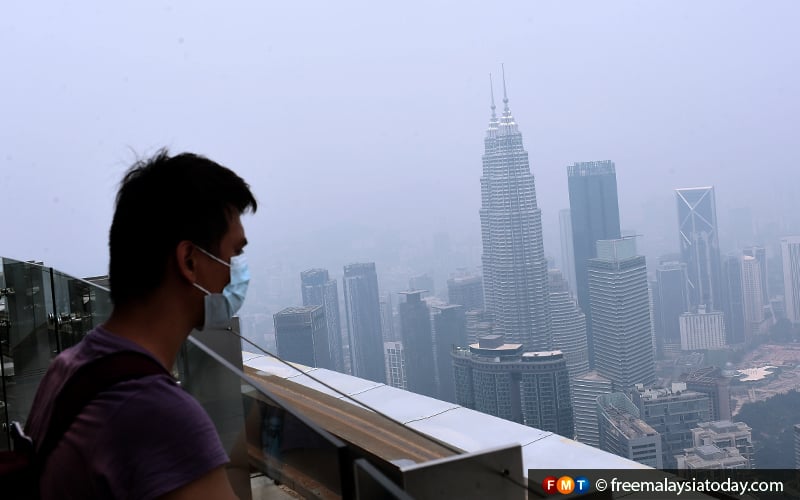
From Jayaprakash Murulitharan
As we usher in 2024, ominous signs loom over Malaysia, heralding what experts predict to be the hottest year on record. According to the global daily average sea surface temperature data, January 2024 has already set a troubling milestone, marking the highest month of sea surface temperature levels seen since 1981.
This alarming trend foreshadows an impending heatwave of unprecedented proportions, prompting concerns about its ramifications closer to home.
Malaysia braces itself for the return of an unwelcome guest: the haze, slated to arrive around September this year. However, unlike previous years, forecasts paint a bleaker picture, promising thicker smoke with more pollutants creeping across our borders.
The convergence of El Niño and the southwest monsoon is pivotal in exacerbating fires and smoke drift toward Malaysia, particularly from August to September.
Over the past few decades, Malaysia has witnessed a recurring pattern. The occurrence of El Niño coincided with the emergence of severe haze conditions, exemplified by the prevalence of thick smoke from 1997 to 2019.
This year, the escalation of fires originating from peatland fires in Sumatra and Kalimantan is anticipated, fuelled by exacerbated drought conditions preceding the southwest monsoon season.
Coupled with the relentless expansion of oil palm plantations in regions like Jambi, Riau, and South Sumatra, as well as ongoing massive forest clearing due to mega urban development projects, such as the new Indonesian capital in Kalimantan, the stage is set for a perfect storm of haze in Malaysia.
Proactive measures
Research indicates that an astonishing 95% of haze is comprised of fine particulate matter, such as PM2.5, which presents grave health hazards, including carcinogenicity, cardiovascular ailments, asthma exacerbation, and hypertension.
Despite existing institutional mechanisms within Malaysia and Asean, Malaysia must take proactive measures to mitigate the looming threat effectively.
An economic assessment during the two-week haze episode in September 2015 in Kuala Lumpur showed an estimated economic loss of approximately RM1.5 billion to various sectors involving flight cancellations/delays, increase in hospital admissions, disruption in work productivity due to absence from work, and the impact on local businesses.
Hence, the government should undertake some key steps in critical sectors to avoid incurring damaging economic losses during the impending haze in 2024, such as the following:
Haze preparedness in schools
Addressing the revision of the school curriculum amid concerns over air quality is a sensitive issue that warrants careful consideration given the potential health risks posed by elevated PM2.5 levels from the haze.
As we anticipate a spike in air pollution during September 2024, it becomes imperative to prioritise the well-being of students and educators alike.
It’s essential to emphasise that this measure is not intended to compromise the educational experience or limit students’ opportunities for physical activity. Instead, it reflects a proactive approach by the government to prioritising health and safety in the face of air pollution.
Proactive planning and early communication regarding rescheduling school activities can prove invaluable in mitigating disruptions and ensuring the efficient utilisation of time for parents and educational institutions.
This approach fosters transparency, enhances parental involvement, and promotes a sense of preparedness within the school community.
The education ministry and state education departments can implement measures that balance academic enrichment, safeguard students’ health during the haze, and avoid the usual uncertainty of the heterogeneity of Air Pollutant Index (API) readings within a district.
Remote work solutions
Encouraging companies to implement work-from-home (WFH) arrangements is a proactive measure to safeguard employee health and ensure uninterrupted productivity amid the air pollution.
In this way, companies can demonstrate their commitment to prioritising their employee’s well-being and safety. Implementing WFH also ensures uninterrupted productivity as it allows employees to maintain their workflow without disruption.
Adapting events to haze
Amid hazardous haze conditions, it is strongly advised to prioritise public health and safety by postponing or relocating outdoor events to indoor venues. Additionally, early planning for event postponement can mitigate financial losses for organisers.
Organisations can avoid last-minute cancellations or changes by anticipating haze conditions and making timely adjustments, reducing potential expenditures and maximising resources.
This proactive approach protects public health and preserves event organisers’ financial stability, fostering resilience in the face of environmental challenges.
Urgent traffic regulations for clean air in cities
Immediate action is needed to implement stringent traffic regulations to curb vehicular emissions contributing to ambient air, particularly in densely populated cities like Kuala Lumpur, Johor Bahru and Penang.
By imposing strict measures to reduce traffic congestion and promote cleaner transportation alternatives, authorities can significantly mitigate local air pollution sources during haze.
This can contribute to immediate improvements in air quality and lay the groundwork for less degraded air quality during haze.
Strengthening healthcare preparedness
As the threat of respiratory illnesses looms with the impending haze season, allocating additional resources to healthcare facilities is imperative. By proactively bolstering healthcare infrastructure and staffing, authorities can effectively manage the anticipated surge in respiratory ailments exacerbated by the poor air quality.
These vital resources will ensure prompt medical attention for affected individuals and alleviate any strain on healthcare systems.
While the above measures may appear drastic, they are indispensable for safeguarding public health and mitigating the adverse impacts of the impending haze crisis.
In light of climate change, proactive intervention is imperative, especially with the looming threat of fires. While it may be customary to express frustration towards our neighbouring country, the reality is that we will inevitably face the consequences of forest fires come September.
Therefore, let us not merely hope for the best but take decisive actions to ensure resilience during the haze season in 2024. We can navigate this environmental challenge with strength and determination by implementing the necessary changes and embracing adaptability. - FMT
Jayaprakash Murulitharan is a research specialist with Cambridge University and an FMT reader.
The views expressed are those of the writer and do not necessarily reflect those of MMKtT.



No comments:
Post a Comment
Note: Only a member of this blog may post a comment.